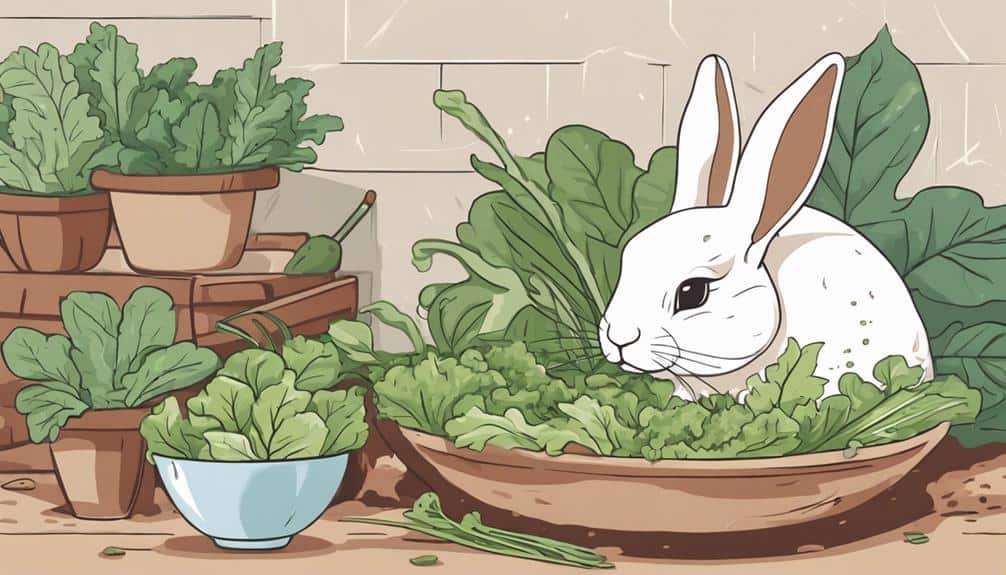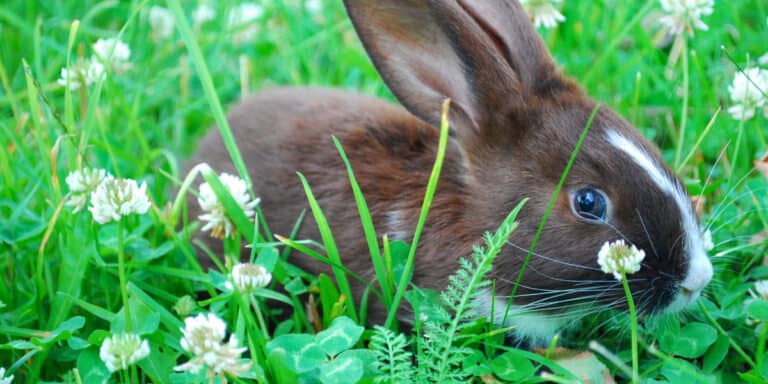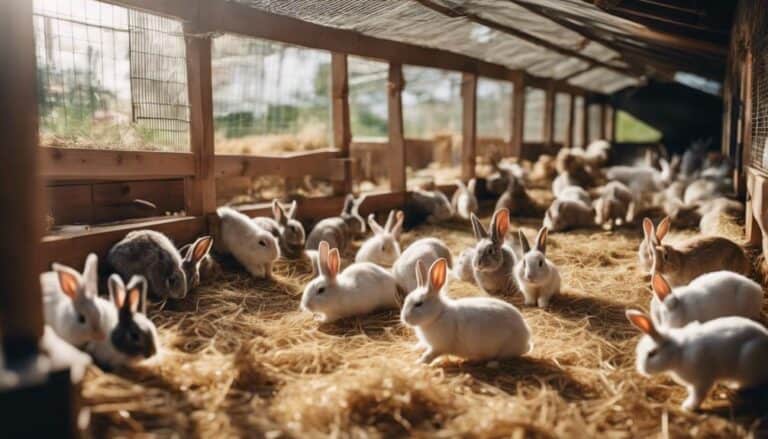Are you prepared to provide the best care for your pregnant bunnies? Understanding the fundamental tips for ensuring the well-being of expecting rabbits is important for a successful pregnancy and birth.
From recognizing signs of pregnancy to preparing for maternal care, each step plays an essential role in supporting the health and comfort of both the mother and her kits.
Stay tuned to learn the essential strategies that can make a significant difference in the journey of caring for pregnant bunnies.
Contents
Key Takeaways
- Recognize signs of pregnancy through behavior and physical changes.
- Provide a comfortable nesting area with soft bedding and privacy.
- Ensure proper nutrition and hydration with a balanced diet.
- Monitor health, behavior changes, and prepare for birth attentively.
Recognizing Signs of Pregnancy

To identify signs of pregnancy in bunnies, observe for increased appetite and weight gain as key indicators. A pregnant rabbit may exhibit nesting behavior, preparing a cozy spot for her upcoming litter. Additionally, behavioral changes such as mood swings or heightened aggression can signal pregnancy in rabbits.
When suspecting pregnancy, gently palpate the rabbit's belly to feel for developing fetuses, which are usually around the size of an olive. These subtle signs can help you determine if your bunny is expecting. If you notice these symptoms, it's important to consult a veterinarian for confirmation through ultrasound or other diagnostic methods.
Veterinarians can provide essential guidance and support throughout the pregnancy journey, ensuring the health and well-being of both the mother rabbit and her babies. Being attentive to these signs and seeking professional help will help you care for your pregnant bunny effectively.
Providing a Comfortable Nesting Area
Creating a cozy nesting area is important for guaranteeing the comfort and well-being of your pregnant bunny during the birthing process. To provide the best environment for your rabbit and her kits, follow these essential tips:
- Use soft bedding: Line the nesting box with soft, clean hay or straw to create a warm and comfortable space for the pregnant bunny to give birth and care for her newborn kits.
- Guarantee privacy: Select a nesting box that's large enough for the pregnant bunny to move comfortably and provide privacy during the birthing process. This will help reduce stress and ensure a calm environment for the mother and her babies.
- Monitor regularly: Keep a close eye on the nesting area. Check it regularly to guarantee it stays clean, dry, and free from drafts. Monitoring the nesting box will help you maintain a safe and cozy space for your pregnant bunny and her kits.
Ensuring Proper Nutrition and Hydration

For prime health and well-being, pregnant bunnies require a balanced diet rich in fiber and access to clean, fresh water at all times. During pregnancy, a female bunny's nutritional needs increase to support not only her own health but also the development of the growing kits inside her. Provide a diet consisting of high-fiber timothy hay, fresh vegetables, and quality pellets to make sure she receives the necessary nutrients. Additionally, offer alfalfa hay to supplement her calcium and protein intake, important for healthy bone development in the kits. It's important to monitor her food intake carefully to prevent overfeeding, which can lead to obesity and birthing complications.
Ensuring access to clean, fresh water is equally important for proper digestion and hydration. Pregnant bunnies need to stay hydrated to support their own health and the development of the babies. Consult a veterinarian for specific dietary recommendations tailored to your bunny's individual needs to guarantee she receives the best possible care during this critical time.
Monitoring Health and Behavior Changes
When monitoring the health and behavior changes of a pregnant bunny, observe for signs of weight gain and increased appetite as indicators of pregnancy. These changes are common in pregnant bunnies and can help you prepare for the arrival of baby rabbits. Additionally, keep an eye out for behavioral changes such as nesting behavior or increased grooming, as these are instinctual actions that show the bunny is getting ready for birth.
Look out for signs of distress or lethargy in the pregnant bunny, as these could be indications of health issues that need attention.
Monitor the pregnant bunny's activity levels and interactions with her environment to make sure she's comfortable and content during this critical time.
If you notice any concerning health or behavior changes in the pregnant bunny, don't hesitate to consult a veterinarian for professional advice and assistance in providing the best care for your bunny and her upcoming litter.
Preparing for Birth and Maternal Care

To guarantee the well-being of the pregnant bunny and her upcoming litter, establishing a comfortable and secure nesting environment is essential.
Provide a quiet nesting area with hay and soft materials, allowing the mother bunny to build a cozy nest. Monitor her closely for signs of labor, such as fur pulling and restlessness, especially as the due date approaches.
Make sure the nesting area is warm, secure, and free from disturbances to help the mother feel safe during birth. Allow her privacy and minimal handling during birth to reduce stress and promote natural maternal instincts.
Be prepared with necessary supplies like extra bedding, clean towels, and a heat source in case of any complications during birth. Remember, creating a peaceful environment and supporting the mother bunny's natural instincts are vital for a successful birthing process.
Frequently Asked Questions
How Do You Take Care of a Pregnant Rabbit?
To care for a pregnant rabbit, guarantee proper nutrition, monitor weight, and create a cozy nest for nesting. Provide emotional support, avoid stress, and offer gentle handling. Prepare for birth with veterinary check-ups and bonding time.
What Do Pregnant Bunnies Need?
During pregnancy, pregnant bunnies need a cozy nest box, balanced diet, and constant water. Keep them stress-free in a quiet area. Regular monitoring and supportive bedding guarantee their well-being. Remember, a little extra care goes a long way!
What Are the Habits of a Pregnant Rabbit?
During pregnancy, rabbits exhibit nesting behavior, weight gain, and increased appetite. They show hormonal changes, seek solitude, and build nests with nesting materials. Provide vet checkups, monitor food cravings, and offer proper pregnancy care for their well-being.
How Do You Prepare a Rabbit for Birth?
To prepare a rabbit for birth, you should focus on creating a cozy nesting spot, offering a nutrient-rich diet, and monitoring her weight. Recognize signs of labor, provide comfort, and be ready for emergencies.
Conclusion
As you navigate the delicate journey of caring for pregnant bunnies, remember to be the gentle gardener nurturing a blossoming garden of new life.
With keen observation, tender care, and a nurturing spirit, you can guarantee a safe passage for the expecting does and their precious offspring.
Trust in your instincts, listen to the whispers of nature, and watch as your efforts bloom into a tapestry of maternal love and tender care.
Embrace this magical time with grace and compassion, for you're the guardian of life's delicate dance.






